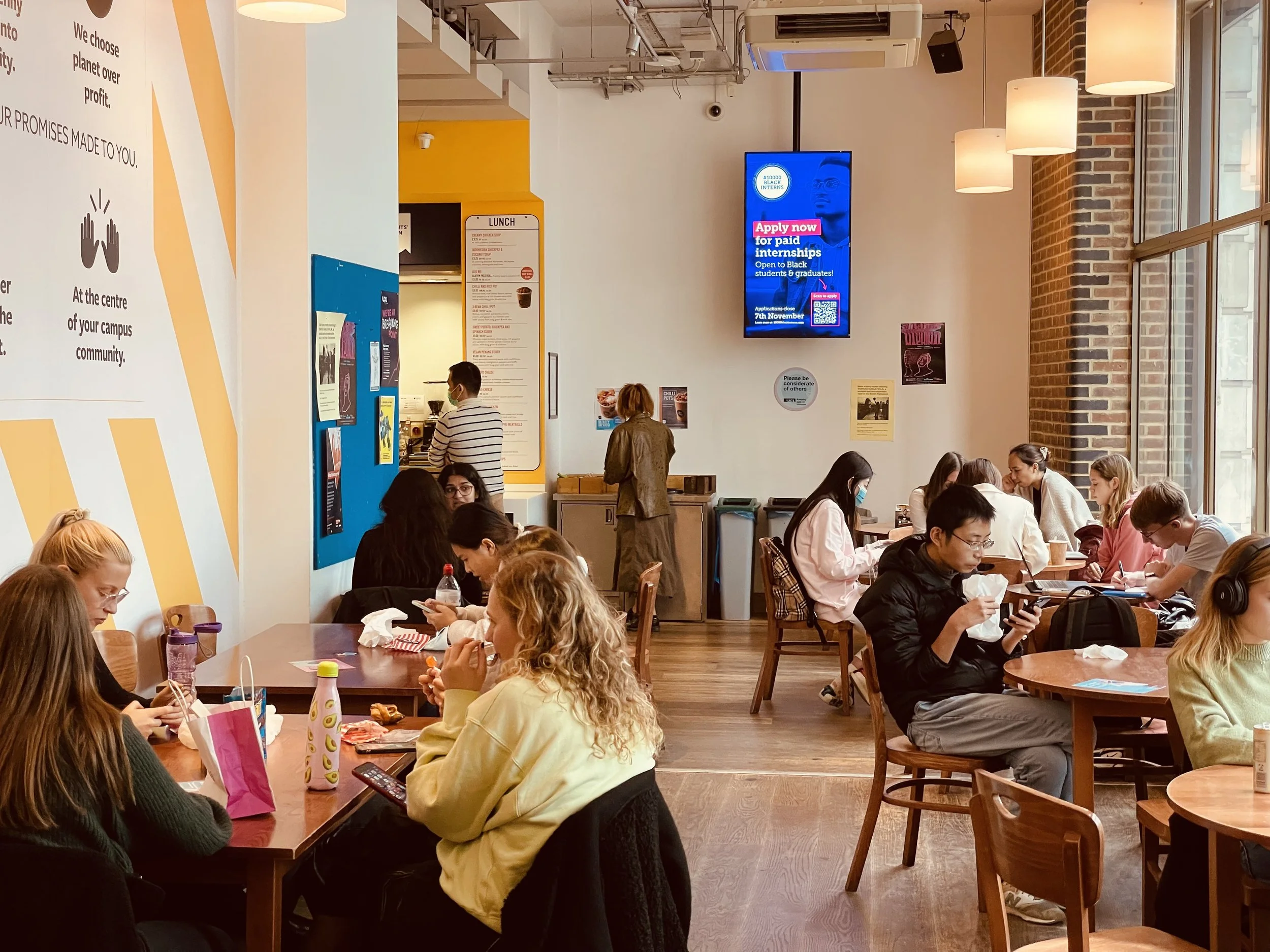In Conversation with 10,000 Black Interns
We recently ran a campaign with 10,000 Black Interns in order to raise awareness and encourage black students to apply to the programme. 10,000 Black Interns seeks to offer 2,000 internships each year for five consecutive years, for young black people across the UK who might otherwise struggle to find such opportunities. It’s an important initiative, transforming the horizons and prospects of young black people in the UK, by offering paid work experience across a wide range of industries, as well as world-class training and development.
As the campaign was running for two weeks up until the application deadline, we had to be efficient, and hit hard within the time frame to ensure our audience responded to the advertisements. We therefore chose formats that would ensure maximum reach of our audience, and minimum wastage to the campaign. We advertised on digital screens in 10 universities and we geo-targeted DAX and Spotify to the areas around these 10 universities.
This year, the programme has had 10,200 eligible applicants off the back of their two-month application campaign, and we had the wonderful opportunity to chat to Esther Odejimi-Uzokwe, the Programme Director all about the programme and it’s next steps.
“We actually started as 100 Black Interns just over a year ago. One of our co-founders, who works in investment management, wanted to host a dinner for black investment managers in London, and quickly realised how little of them there were. And that’s out of thousands of firms in the financial capital of the UK- which was a problem, Esther said. “This coincided with the murder of George Floyd, and so the timing was right to do something really tangible about this problem and positive for black people around the UK.
“So that’s how the idea of 100 Black Interns came about, and at first it was just to get 100 internships for black people in investment management.”
The company reached out to firms asking whether they’d be interested in the initiative, to offer one internship to any black student across the UK or doing higher educational study. They had to last for a minimum of 6 weeks and pay at least minimum wage.
Esther said, “It had to be in a client facing role; because another nuance we noticed was that some companies didn’t struggle to get in diverse talent, but many of them were in middle/back office roles- and there’s nothing wrong with those roles, but the point of the initiative was that they shouldn’t be a glass ceiling over a black person’s head.
“So we started approaching the firms, and within less than a day had more than a hundred saying
yes, so we doubled the intake to 200. That year, 501 interns ended up being hired.
“When we opened up applications to students, we were expecting a couple hundred, and ended up getting 2167 eligible applications. The success of the first years programme was what gave rise to 10, 000 Black Interns.
“Another issue with the investment management industry was that women only made up 20% of it,
but we then had 42% of applications from black women, and that translated into 45% of black
women receiving offers in investment management. Whilst we were focusing on investment management, other industries started catching wind of the work we were doing. Now we’re in collaboration with over 600 firms in the UK, representing 24 sectors.”
From offering these internships to young black people across the UK, the programme is opening up so many opportunities that they may have struggled to find otherwise. When asked if she can feel the difference they’re making, Esther said, “100%. Even just from having conversations with our interns we can really see the difference. One of our interns said she got an interview through this programme when she’d been previously rejected by that same firm, which is extremely interesting .This may not necessarily mean that a particular firm or industry is racist, however there is something to be said about the racism that is proven to exist in traditional recruitment practices. Once an organisation is intentional about hiring Black candidates,
surprise, surprise! They actually hire Black people. We can feel the impact we’re making,
because we’re hearing the testimonies live and direct from our interns.
To drive that home, 72% of the programme’s candidates have said that they are convinced they would not have secured an internship in that summer without the 10,000 Black intern’s intervention.
To close the interview I asked what the next steps were for them. Esther said, “When applications
closed, we took a step back last week and thought, ‘hold on a second, 10,200 people have been
touched by our programme in some way, shape or form’. It’s a great feeling, and we’re so happy to
be able to help.
“We’re very focused on delivering what we’ve said we’re going to deliver first and foremost. We know we exceeded our own expectations within the first year, and right now all of us are aware we’ve grown crazily fast. And that requires more resource, effort and focus, so we’re very focused on making sure we do what we’ve said we’re going to. But there are so many avenues we could expand into, and when the time is right, I’m sure that work will get done.”


